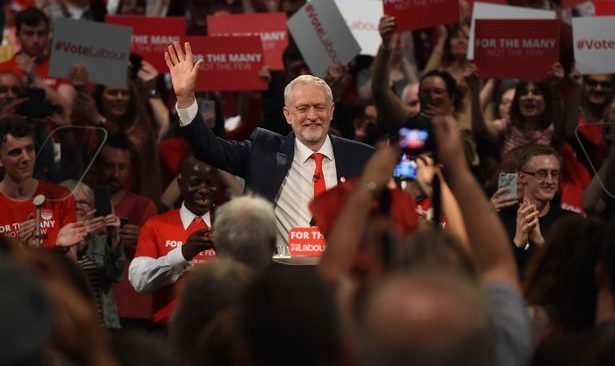The leavers are rising in the polls and everyone is starting to get scared that they might actually win. And, of course, it’s Jeremy Corby’s fault.
It’s not unusual for Corbyn to come under attack, he doesn’t sing loud enough, or bow at the proper angle, and he baulks at the idea of mutual mass destruction. And we all know what Cameron thinks about his suit and tie. But what is odd is that this time around he’s effectively being criticised for not coming to the aid of his opponent in his hour of need.
David Cameron is struggling to get his message across. For the first time his privilege is not buying him an easy ride with an unusually un-supplicant press: and he’s looking to those with experience of not having everything their own way.
Cameron did not see this coming, but in many ways he is the architect of his own downfall. The establishment is trying to pin the blame on the Labour leadership but everything about this is a Tory mess. Even leaving aside that the very referendum is Cameron’s own fault – a self-serving promise to prevent haemorrhaging even more votes and party “loonies” to UKIP – the actions of the Tories have created a situation in which rational argument has lost its power and a new idiocracy rides the waves of ill-informed public opinion.
When Ed Miliband said that the media has focused on the “sexy blue-on-blue action” in covering the referendum campaign, he may have made Today programme listeners push away their boiled eggs, but he was right. Labour has been hamstrung in getting the socialist case for remaining in the EU across, not through a lack of passion, but through a lack of coverage.
Labour (and especially Ed) are used to this, but it is the first time that sections of the Conservatives have been on the wrong side of the tactics that they have spent the last 10 years developing.
So successfully have they terrified the BBC into a false version of impartiality they call ‘balance’, that ideas are never challenged, only countered. Lies are given equal weight to the truth.
And the right wing press doesn’t even have to pretend to be impartial. So if a view – or most frustratingly a fact – isn’t palatable to the owners and their editors then it will get the shortest of shrift. This is a problem. Yes, social media and the internet means that we can go beyond newspaper bias to get to more of the truth – but only if we have the time, critical analysis skills and networks to do so. We can hear Jeremy Corbyn’s every word, see every stroke his cat gets, if we subscribe to it on Twitter, Instagram and Snapchat: but in the mainstream media his statements are not treated impartially. They are given less credence than those who are prepared to spread lies, to deny facts and give the appearance of idiots when it suits them.
Now the Tory leadership is feeling the Iain Duncan Smith effect: a man who has casually denied links between his workplace capability assessments and the deaths of those they removed benefits from, a man who has defended the fiasco of universal credit, a man who tried to change a law to make his actions over workfare legal after they’d been ruled otherwise by the high court, a man who has made an artform of using false statistics in the face of the evidence and chastisement from the ONS, a man whose greatest lie may have been that he cared. Through all that Smith knew that the right wing press would support him and that a neutered BBC would let his statements pass without comment, given equal credibility as the truth.
And as a result, he has become unanswerable. As Auden said, “A sentence uttered makes a world appear; Where all things happen as it says they do.” He believes that he can say anything; he can. And of course others have seen it work and take advantage too.
From the Hutton report onwards, the BBC has shied away from confrontation in news: and the Tories have enjoyed every moment of it. They spent six or seven years being unchallenged on their lies about the causes of the financial crash, and they grew in confidence to the point where they felt able to say “I don’t accept that view” and dismiss any factual argument put to them.
We are living in an age that is post-democracy. Power is concentrated in an elite, says political scientist Colin Crouch, who make “electoral debate a tightly controlled spectacle… considering a small range of issues.” The majority of the electorate, he says, play “a passive, quiescent, even apathetic part, responding only to signals given to them.” In a single issue vote, with a narrow debate, this makes the infantalisaton of our media actively dangerous to democracy: and we’re seeing this turned up to 11 by a band of chancers that display no more signs of intelligence than Nigel Tuffnell, let alone Nigel Farage.
The lie of the £350M sent to Brussels – proven not to be true, widely debunked, yet still emblazoned across the Leave campaign bus – is the ultimate example of this. It sits in the background on breakfast TV, the moderators on the ITV debates don’t challenge Boris Johnson when he repeats it again and again
David Cameron and his ilk have a specific problem too: the Tories have consistently stoked fear of immigration, because otherwise they’d have to admit that austerity and privatisation is the cause of stress on housing, jobs and services – not migrants. They can’t defend the lies of the leave campaign and are trapped by their own past rhetoric. Consummate politician though Cameron is, he doesn’t quite have the confidence to U-turn on that. There’s no doubt, however, that the idiots would flip and tell that truth if it suited them. They are not just post-democracy, but post-truth.
There are stories that Leave literature has been telling black and asian communities that there will be more and easier immigration after leaving Europe, in direct contrast to the anti-immigration narrative that we hear elsewhere from the same campaign. Likewise the EU is labelled undemocratic by those who don’t turn up to vote despite having been elected to its parliment, and those who would happily turn any state control over to the private sector.
We have a referendum debate conducted in a post-democracy, post-truth, landscape: one where facts aren’t valued and liars aren’t called out. We have already had a Trexit and left a place where rational argument holds any sway.
Continue reading “The rise of the idiocracy”

